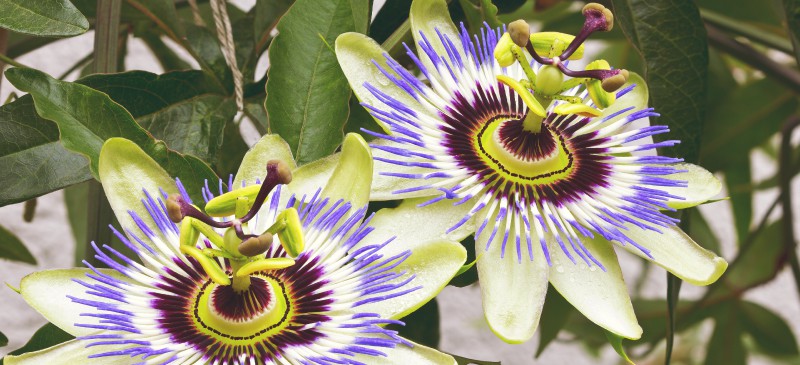Benefits Of Passion Flower Herbs: The native American passion flower, Passiflora incarnata, is a member of the flowering vine genus that is widespread throughout the world.
The eye-catching passion flower has an outer ring of flat, violet-colored petals and an inner ring of darker, tendril-like petals.
A fruit known as a maypop is produced by some varieties of passion flowers. The plant’s stems, leaves, and blossoms all have certain health advantages.
Anti-Depressant and Menopause Relief
According to a study printed in the April 2011 issue of the journal “Fitoterapia,” passion flower enhances the anti-depressive effects of St. John’s wort. Researchers came to the conclusion that combining the two herbs may allow for the use of lower doses of St. John’s Wort in the animal trial since supplementation with a combination of passion flower and St. John’s Wort considerably increased the advantages of St. John’s Wort. According to research published in the fall 2010 issue of “The Iran Journal of Nursing and Midwifery Research,” taking supplements with passion flower reduced depression as well as other menopausal symptoms like headache, insomnia, and rage. For six weeks, participants took daily dosages of passion flowers.
By the third week, significant symptom alleviation had taken place. Researchers came to the conclusion that passion flower may be useful for women who cannot or do not want to undergo hormone replacement therapy in managing menopause.
The Benefits Of Passion Flower Herbs
Anti-Anxiety
The June 2011 issue of “Phytotherapy Research” featured an animal study that showed the anti-anxiety properties of passion flowers. During a labyrinth test, animals given dosages of 150 milligrams per kilogram body weight spent more time in exposed, elevated, and open sections.
Additionally, neither a sedative nor a stimulating impact was produced by the supplement. According to a study that appeared in the “Journal of Ethnopharmacology” in March 2010, passion flower extract had a calming impact at low dosages while having a sedative effect at higher concentrations.
Blood Pressure-Lowering
According to an animal study that was published in the “Journal of Nutritional Biochemistry” in January 2013, passion flowers may help control high blood pressure. Passion flower skin extract doses of 50 mg/kg body weight successfully lowered high blood pressure levels.
Researchers discovered that the advantages were due to antioxidant molecules found in anthocyanins and a substance called edulilic acid found in passion flowers.
The pulp of the passion flower fruit, which represents the upper number of the blood pressure ratio and represents the pressure in arteries during heart contraction, was found to significantly lower systolic blood pressure in an animal study that was reported in the February 2013 issue of the journal “Phytotherapy Research.
Additionally, the levels of an antioxidant enzyme and oxidized lipids—lipids damaged by accumulated pollutants and waste—were both boosted and decreased by the passion flower extract. For five days, 8-milligram doses were given out by the researchers.
Also Read: Five Foods To Have On Hand In Case You Become Ill
Sleep Aid
In a research published in the August 2011 issue of “Phytotherapy Research,” passion flowers increased sleep quality. For one week, participants, aged 18 to 35, with mild sleep disorders drank one cup of passion flower tea every night while keeping a sleep diary and answering questions about their sleep quality. Results demonstrated that when compared to a control group that did not receive passion flower, passion flowers significantly improved six of the seven aspects of sleep quality.
Also Read: Coffee Habits That Speed Up Aging, According To A Dietitian
Some FAQs
How do you use passion flower herb?
Boiling water and dried passionflower can be combined to make herbal tea. Many health food stores sell dried passionflower or tea that has already been packed. Additionally, liquid extracts, capsules, and tablets are available.
Is Passion flower toxic to the liver?
An extract from the petals of the Passiflora incarnata plant known as passionflower is touted to have calming effects that are both natural and effective in the treatment of anxiety and insomnia. Both clinically obvious liver damage and elevated serum enzyme levels have not been linked to passionflower.
Who should not take passionflower?
Pregnant women shouldn’t consume passionflower. This is due to the possibility that it will stimulate the uterus and start labor. Passionflower should be stopped taking at least two weeks before surgery if you expect to have it.




